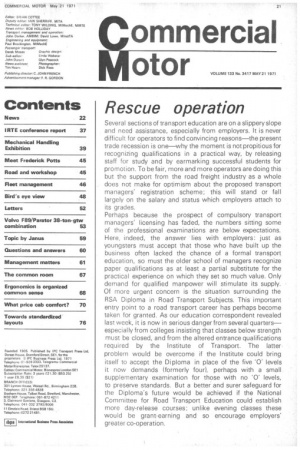Rescue operation
Page 23

If you've noticed an error in this article please click here to report it so we can fix it.
Several sections of transport education are on a slippery slope and need assistance, especially from employers. It is never difficult for operators to find convincing reasons—the present trade recession is one—why the moment is not propitious for recognizing qualifications in a practical way, by releasing staff for study and by earmarking successful students for promotion. To be fair, more and more operators are doing this but the support from the road freight industry as a whole does not make for optimism about the proposed transport managers' registration scheme; this will stand or fall largely on the salary and status which employers attach to its grades.
Perhaps because the prospect of compulsory transport managers' licensing has faded, the numbers sitting some of the professional examinations are below expectations. Here, indeed, the answer lies with employers: just as youngsters must accept that those who have built up the business often lacked the chance of a formal transport education, so must the older school of managers recognize paper qualifications as at least a partial substitute for the practical experience on which they set so much value. Only demand for qualified manpower will stimulate its supply. Of more urgent concern is the situation surrounding the RSA Diploma in Road Transport Subjects. This important entry point to a road transport career has perhaps become taken for granted. As our education correspondent revealed last week, it is now in serious danger from several quarters— especially from colleges insisting that clasSes below strength must be closed, and from the altered entrance qualifications required by the Institute of Transport. The latter • problem would be overcome if the Institute could bring itself to accept the Di ploma in place of the five '0' levels it now demands (formerly four), perhaps with a small supplementary examination for those with no '0' levels, to preserve standards. But a better and surer safeguard for the Diploma's future would be achieved if the National Committee for Road Transport Education could establish more day-release courses; unlike evening classes these would be grant-earning and so encourage employers' greater co-operation.






























































































































